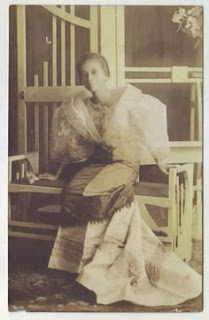Philipine:
Man’s Top (Barong Tagalog) collarless shirt, often wears
hat called Salakot
Women’s
skirt- Barot’ Saya ( blouse, shirt,
skirt)
The revolution of Philippine top from late 1960s-1970s
Architectural butterfly sleeves, the traditional "baro't saya" was worn by
upper class and for special occasions in the Philippines during the latter 19th
and early 20th century
Men: A
traditional garment for men is the barong tagalog (pronounced BAH-rong tah-GAH-lawg), an embroidered outer shirt, worn
untucked.
It has collars, long
sleeves and
mid-thigh horizontal hemline with side slits. It is made from pina (pineapple fibers), jusi
(raw silk) or ramie (grass fibers).
Women: Women wear the heavily starched, butterfly-sleeved terno (pronounced tee-AIR-no) and a matching long skirt on formal occasions.
Muslims: The various Muslim groups in the south and the mountain tribes have their own distinctive garments. The Maranao Muslims of southern Mindanao, for instance, have the colorful malong. It is a large cloth wrapped around the body and is worn by both men and women.
Women: Women wear the heavily starched, butterfly-sleeved terno (pronounced tee-AIR-no) and a matching long skirt on formal occasions.
Muslims: The various Muslim groups in the south and the mountain tribes have their own distinctive garments. The Maranao Muslims of southern Mindanao, for instance, have the colorful malong. It is a large cloth wrapped around the body and is worn by both men and women.








No comments:
Post a Comment